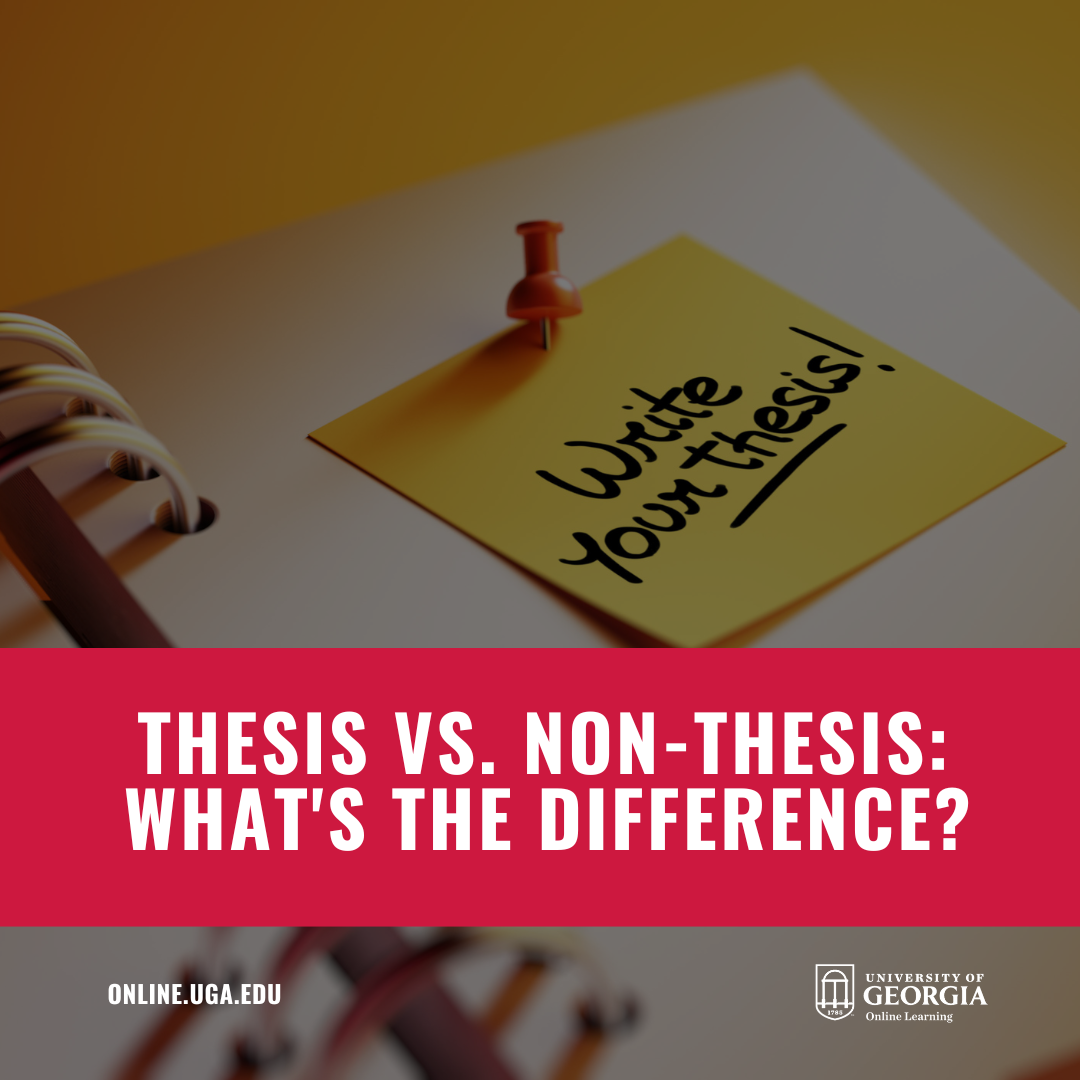- Communications
- Computer Science
- Criminal Justice
- Environmental Management
- Forensic Psychology
- Healthcare Admin
- Human Resources
- Project Management
- Social work
- Special Education
- Sports Management
- Supply Chain Management
- Adult Education
- Business Intelligence
- Early Childhood Education
- Educational Technology
- Homeland Security
- Information Systems Security
- Information Technology
- International Business
- Management Information Systems
- Nonprofit Management
- School Counseling
- Academic Publishing Guide
- Building a Graduate School Resume or CV

Choosing Between a Thesis or Non-thesis Master's Degree
- Expert Guide to Studying Abroad
- FAQ: Online Master's Degrees
- Grad School Guide Book
- Graduate School for Students with Disabilities
- Green Graduate Degrees
- How to Be a Successful Grad Student
- How to Choose the Right Graduate Program
- How to Get a Master's Degree in an Unrelated Field
- How to Transfer College Credits in Grad School
- How to Write a Winning Personal Statement
- Inside Graduate Admissions
- Ivy League Grad Schools
- Master's Degrees for Veterans
- Master's Degree for Women
- Mental Health in Grad School
- Progressive LGBTQ Graduate Degrees
- Should You Apply for a Graduate School Assistantship?
- Surviving Grad School with a Family
- Taking a Gap Year Before Grad School
- Women in STEM Graduate Resources
- Writing a Successful Statement of Purpose
- Alternative Ways to Pay for School
- The Best Part-Time Jobs During Grad School
- Company Funded Graduate School
- FAFSA For Grad Students
- Financial Aid Resources
- Graduate Student Loans
- Paying for Your Master's Degree
- Paying Off Student Loans
- Paying for Your PhD
- Fellowship Opportunities
- LGBTQ Scholarships
- MBA Scholarships
- Scholarship Resources
- Scholarships for Veterans
- Scholarships for Women
- Crushing the GRE Guidebook
- GMAT Guidebook
- Guide to the LSAT
- MCAT Prep for Medical School
- Study Guide: Exam Resources
- TOEFL Prep for Non-Native English Speakers
- Resources Choosing Between a Thesis or Non-thesis Master's Degree
As of 2015, approximately 25.4 million Americans held advanced degrees , with more citizens joining these ranks each year. As studies continue to show the career advancement and salary benefits of completing a master's degree, more and more students elect to pursue advanced educations. When considering their options, many question whether to enroll in a master's requiring a thesis or not. The following guide examines some of the reasons degree seekers may want to write a thesis while also highlighting why they might not. Students on the fence about this important decision can find expert advice, actionable tips, and relevant guidance to help them make an informed choice in the guide that follows.
Understanding the Master's Thesis
What is the difference between a thesis & non-thesis master's program, the decision not to do a thesis.
As students research various master's programs in their chosen discipline, it's common to find that many degrees require a thesis – especially if they want to enter a research-heavy field. While this word gets thrown around a lot in academia, some learners may want more information regarding what it entails in order to make an informed decision.
What is a Master's Thesis?
The master's thesis is an original piece of scholarship allowing the student to dig into a topic and produce an expanded document that demonstrates how their knowledge has grown throughout the degree program. These documents require significant independent research of primary and secondary sources and, depending on the subject, may require interviews and/or surveys to support the overarching argument.
Individual schools and departments dictate the length of these documents, but they typically range between 60 and 100 pages – or approximately 20,000 to 40,000 words. While tackling a document of such heft may seem overwhelming at first, learners need not fret. Each master's candidate receives a faculty advisor early in their tenure to provide support, feedback, and guidance throughout the process. Because the final thesis is expected to be of a publishable quality, learners seeking the highest marks typically send their supervisor excerpts of the document as they write to ensure they are on the right track.
When picking a thesis topic, no magical formula exists. Students should consider their interests and read extensively on that topic to get a better sense of existing scholarship. They should also speak to other academics working in that sphere to familiarize themselves with ongoing projects. Only after they feel reasonably well-read should they begin looking for uncovered angles or interesting ways of using emerging methodologies to bring new light to the topic.
When considering formatting, degree seekers should check with their specific schools and departments, as they may have unique requirements. To get a general understanding of what to expect, learners can review Simon Fraser University's guidelines on thesis formatting. After completing the thesis, some programs require an oral defense before a committee while others read the document and provide a grade. Check with your prospective schools to get a better sense of procedure.
Format & Components of a Master's Thesis
While this guide attempts to provide helpful and actionable information about the process of deciding whether to follow a thesis or non-thesis track in a master's program, readers should remember that specific components and requirements of a thesis vary according to discipline, university, and department. That being said, some commonalities exist across all these – especially when it comes to what students must include in their final drafts.
As the first section a reader encounters after moving through the table of contents and other anterior text, the introductory allows the writer to firmly establish what they want to accomplish. Sometimes also called the "research question" section, the introductory must clearly state the goals of the paper and the overarching hypothesis guiding the argument. This should be written in a professional yet accessible tone that allows individuals without specializations in the field to understand the text.
This section allows learners to demonstrate their deep knowledge of the field by providing context to existing texts within their chosen discipline Learners review the main bodies of work, highlighting any issues they find within each. Constructive criticism often centers around shortcomings, blind spots, or outdated hypotheses.
Students use this section to explain how they went about their work. While scientists may point to a specific method used to reach conclusions, historians may reference the use of an emerging framework for understanding history to bring new light to a topic. The point of this section is to demonstrate the thought processes that led to your findings.
This section allows for learners to show what they learned during the research process in a non-biased way. Students should simply state what information they gathered by utilizing a specific framework or methodology and arrange those findings, without interpretation, in an easy-to-read fashion.
After providing readers with all the necessary information, the discussion section exists for candidates to interpret the raw data and demonstrate how their research led to a new understanding or contributed a unique perspective to the field. This section should directly connect to the introduction by reinforcing the hypothesis and showing how you answered the questions posed.
Even though the previous sections give prospective degree seekers a better sense of what to expect if they decide to write a thesis during their master's program, they don't necessarily help learners decide whether to pursue a thesis or non-thesis track. The following section highlights some of the reasons students frequently choose to complete a thesis or bypass the process altogether by providing a pros and cons list.
Why a Thesis Program
- Especially when entering a research-heavy discipline, completing a thesis shows prospective schools and employers that you possess the skills needed for researching and writing long-form reports.
- Students hoping to pursue a Ph.D. stand in better stead with admissions panels if they wrote a thesis during a master's program.
- Individuals hoping to enter a field that values syntax and grammar often better their writing skills by completing a thesis.
- Students who write a thesis can submit the final product to various academic journals, increasing their chances of getting published.
- Theses expand students' understanding of what they're capable of, deepen their ability to carry out an argument, and develop their skills in making connections between ideas.
Why a Non-thesis Program
- Because they don't require a significant written product, non-thesis master's tend to take less time to complete.
- Often mirrors a bachelor's program in terms of structure, allowing learners to complete classes and take exams without a great deal of research or writing.
- Students who excel in project-based assignments can continue building skills in this arena rather than focusing on skills they don't plan to use (e.g. research)
- Provides learners the opportunity to work more closely and more frequently with faculty on real-world projects since they don't spend hundreds of hours researching/writing.
- Allows learners to take more classes and gain hands-on skills to fill the time they would have spent researching and writing a thesis.
How to Choose a Master's Program: FAQs
Within some academic disciplines and professional fields, research and writing plays a key role in work done on a daily basis. Because of this, master's programs in these fields require learners to complete theses to compete against peers and be seen as competent in their work. Other disciplines, conversely, rely on other tools to accomplish work and progress ideas – making theses less important.
Yes. Master's programs focused more on application than research typically don't require a thesis – although they may still give students the option. Examples of common non-thesis master's programs include nursing, business, and education.
Even though non-thesis students won't be writing a 100-page paper, that doesn't mean they avoid completing a significant project. In place of a thesis, most applied master's programs require students to take part in at least one internship or complete a culminating project. These projects typically ask learners to take what they learned throughout coursework and create an expansive final project – examples include case studies, creative works, or portfolios.
While students who followed a non-thesis path routinely receive acceptance to Ph.D. programs, those with theses often find the process easier. Even if a learner pursues a Ph.D. in a discipline that isn't research-heavy, admissions panels still want to get a sense of your academic interests and ability to engage in independent, nuanced thought. Students with theses can provide solid proof of these skills, while those without may struggle to demonstrate preparedness as thoroughly.
The answer to this question depends on many factors, but typically it is okay not to do a thesis if you plan to enter a field that doesn't depend heavily on research or writing, or if you don't plan to complete a Ph.D.
Students wanting to work in academic, research, or writing should always opt for the thesis track. They should also follow this path if they have any doctoral degree aspirations.
Ultimately, the decision of whether or not to complete a thesis rests with the individual student. Figuring out how to proceed on this front requires lots of careful consideration, and learners should ensure they consider various aspects before coming to a final decision. The following section helps students consider how they should and should not come to a conclusion.
Dos and Don'ts of Choosing a Thesis or Non-thesis Program
- Consider the longevity of your decision: will you feel the same in 5-10 years or are you making a decision based on current desires?
- Talk to others who with experience in this area. Ask them questions about their decision-making process and if they regret their choice.
- Research potential thesis topics before starting a program. Going in with a game plan can help you feel more confident and settled about the process than if you're scrambling for a topic while in school.
- Reach out to prospective schools to speak with faculty and/or current students following both tracks. This will provide knowledge specific to the school while also expanding your network if you choose to attend there.
- Research Ph.D. entrance requirements to ascertain if the majority expect learners to possess a thesis when applying. This will give you a sense of whether you may experience issues later on if you do not complete one.
- Decide not to complete a thesis simply because you have never taken on such a task and feel overwhelmed or fearful that you will fail.
- Complete a thesis simply because you think it will look good on your resume. Theses require intense devotion over an extended amount of time; learners who complete them without conviction often find the process miserable.
- Forget to research alternatives to writing a thesis. Just because you don't complete a research paper doesn't mean a non-thesis track lacks rigor or challenging coursework.
- Forget to read examples of theses by previous students. If you feel overwhelmed by the task, reading work other people have done can often make the task at hand feel less scary.
- Let yourself off easy by taking the non-thesis path. If you find you have extra time in the program, talk to your advisor about taking more classes, develop meaningful projects for yourself, or see about presenting at an academic conference.
From the Expert

Sudiksha Joshi, Ph.D. is a learning advocate. Her mission is to empower our youth to think bigger, bolder thoughts and forge a career path that will change the world. She taps into her natural curiosity and ability to identify strengths to help students and those in transition find their path from feeling lost in the traditional ways of achieving success to charting their own path. Her work has been featured in Forbes, Huffington Post, Thrive Global, Medium and LinkedIn.
Why might a student decide to follow a thesis track? Why might they follow a non-thesis track?
A student might decide to take a thesis track if she/he wants to pursue a Ph.D. Also, if the students want to focus on careers where research and writing have a strong focus, the students opt for the thesis option. Research assistantships at the graduate level are also more often available to students who opt for the thesis option.
A student who might feel that writing is not one of their strengths might choose to go the non-thesis track. Likewise, a student who has other work commitments may find a non-thesis option more convenient.
Do you have any tips for deciding on a program?
I chose a thesis option because being able to conduct independent research was a big reason to go to graduate school. Also, showing the ability that I could do research was what afforded me research assistantships which meant that my tuition was paid for and I got a stipend that paid for expenses while I was in graduate school. This also allowed me the opportunity to work closely with the faculty mentor that provided me with the support and the accountability I wanted.
I would not recommend taking a non-thesis option if all the degree requires is for you to take courses. You have little to show in terms of your learning other than your grades unless you are already working on something on the side that does that for you and all you need is a certificate.
Opt for a non-thesis option if you can still work closely with a professor or on a project and if you'd rather be involved in multiple projects rather than focus on a single project. If you already have a good (informed) reason for choosing one over the other, go for it.
What's the most important thing to consider when choosing a program?
The most important thing to consider when choosing a program is getting excited about the projects that at least one of the faculty members are involved in. Do some research and see why you are excited about a particular work that at least one of the faculty members have been involved in.
Who should students talk to when considering options?
Students should talk to other students and also reach out directly to the graduate coordinator and even individual faculty members. This means that students should have done prior homework and have some good questions ready. Asking good questions will get you at least halfway through to make the right decision.

- October 15, 2023
- Academic Advice
Thesis vs. Non-Thesis Master’s Programs: Which is Right for You?
UOTP Marketing

Continuing your educational journey within your chosen field is an experience that fosters personal and professional growth. The next milestone in your academic path often involves pursuing a Master’s degree , with options ranging from thesis-based programs to non-thesis alternatives. Deciding between these two paths is significant as it shapes your academic and career paths.
But how can you decide which is right for you before getting decision fatigue?
Let’s explore the difference between thesis vs. non-thesis Master’s programs, their unique characteristics, and reasons for choosing one or the other.
Do You Have to Write a Thesis for Your Master’s Program?
Whether you have to write a thesis for your Master’s program depends on the specific requirements of the program you’re enrolled in. It’s important to note that while not all Master’s programs require writing a thesis, a significant number of them do.
What is a Thesis vs. Non-Thesis Master’s Program?
A thesis Master’s program involves completing a large research project spanning over several semesters. Students are expected to conduct original research on a specific topic under a faculty advisor’s guidance, culminating in a thesis likely to be published. Completing and defending the thesis is a crucial part of the degree requirement.
A non-thesis Master’s program doesn’t involve a specific research focus but rather a more coursework and practical experience, allowing students to gain specific skills and knowledge applicable to their field of study. After completing their program’s core course requirements, students can choose any of the electives to meet their degree requirements. Depending on the institution, you may be required to do a Master’s Degree Capstone project, including reviewing previous courses, a comprehensive exam, or a summary project.
Why Choose a Thesis Master’s Program?

Thesis Master’s programs offer several advantages, be that contributing to new findings in your field, close collaboration with professors and researchers, and standing out to potential employers with your abilities to work independently and analyze complex issues. However, the primary advantages are:
Research Experience
Thesis programs allow you to conduct extensive research on a specific topic that piques your interest. This way, you’ll gain expertise and a comprehensive understanding of the subject matter.
Academic Growth
Writing a thesis helps sharpen your critical thinking, analytical, and writing skills. It also challenges you to think independently, analyze a large amount of data, and draw meaningful conclusions. Furthermore, it prepares you for doctoral studies, familiarizing you with the rigor of independent research and equips you with the necessary skills to succeed.
Why Choose a Non-Thesis Master’s Program?
Non-thesis master’s programs also come with numerous advantages for students, including flexibility in scheduling, a range of career opportunities, shorter competition time, etc. Here are the main advantages:
Non-thesis programs prioritize coursework, fostering the development of practical skills and their real-world application. This approach enables you to actively engage in hands-on learning experiences highly sought after in today’s job market. Critical thinking, communication, problem-solving, and leadership abilities are some of those skills.
Suitability for Professionals
Another advantage to pursuing a non-thesis Master’s program is that it doesn’t take as much time as the thesis Master’s programs. That way you can enter the workforce faster. It’s also well-suited for professionals already established in their field who are seeking to further their education and advance in their careers.
The Academic and Career Outcomes of Thesis vs. Non-Thesis Master’s Programs

The academic outcomes for the thesis Master’s program graduates involve preparation for Ph.D. programs , opening doors to advanced research and specialized roles in research institutions. This provides solid research skills and helps them publish their work. Common career paths for graduates include research positions in academia, government, or private sectors. Some also pursue teaching careers in colleges and universities. Degree programs that usually require a thesis include sciences, social sciences, engineering, and humanities (history, philosophy, and language studies).
Non-thesis Master’s program graduates typically achieve academic outcomes focused on mastering practical, directly applicable skills within their field. While these programs are more career-oriented, graduates can still pursue a Ph.D. They can benefit from diverse career options in different settings and find employment in managerial, administrative, or specialized roles in their field. Degree programs that don’t usually require a thesis are business, education, healthcare administration, IT management, etc.
Thesis vs. Non-Thesis Master’s Programs, That is the Question
With their abundance of advantages, choosing between the two can be pretty tricky. So, let’s compare thesis vs. non-thesis Master’s programs and help you make an informed decision.
Personal and Career Goals
A thesis Master’s program is ideal if you’re interested in furthering in academia and want to pursue a Ph.D ., as these programs can provide the necessary tools to enhance your credentials for research-based careers. Meanwhile, a non-thesis Master’s program will suit you better if you’re seeking to gain practical skills to integrate into the industry immediately, as they can include practical projects or internships according to industry demands.
Time and Financial Considerations
Thesis Master’s programs can extend the duration of your studies, as researching, writing, and defending the thesis can take several semesters to complete and can cause financial strain due to additional costs like lab fees and materials. In contrast, non-thesis ones can help you enter the job market promptly as they are shorter, allowing you to save time and money.
Interested in pursuing a degree?
Fill out the form and get all admission information you need regarding your chosen program.
This will only take a moment.
Message Received!
Thank you for reaching out to us. we will review your message and get right back to you within 24 hours. if there is an urgent matter and you need to speak to someone immediately you can call at the following phone number:.
By clicking the Send me more information button above, I represent that I am 18+ years of age, that I have read and agreed to the Terms & Conditions and Privacy Policy , and agree to receive email marketing and phone calls from UOTP. I understand that my consent is not required to apply for online degree enrollment. To speak with a representative without providing consent, please call +1 (202) 274-2300
- We value your privacy.
Field of Study and Program Requirements
When deciding between a thesis and a non-thesis Master’s program, a crucial element to take into account is the field of study and the program’s specific requirements. A thesis Master’s program is better suited for those pursuing research-oriented fields, while a non-thesis program is a more fitting choice for individuals with a strong focus on their career. Furthermore, program requirements for thesis programs require substantial research to culminate in a thesis, whereas non-thesis ones require capstone projects, internships, or comprehensive exams.
Switching from a Non-Thesis to a Thesis Master’s Program, or Vice Versa
Switching from a non-thesis to a thesis Master’s program, or vice versa, is possible in many institutions, although the process and requirements may vary. Switching from a non-thesis to a thesis program generally requires getting approval from the academic advisor or department, completing additional research methodology classes, finding a thesis advisor, and applying to the thesis program.
Switching from a thesis to a non-thesis Master’s program requires having at least a 3.0 GPA, getting approval from the academic advisor, transferring credits of research methodology classes, and formally applying to the thesis program.
Choosing between a thesis and a non-thesis Master’s program ultimately depends on your career goals, research interests, and personal preferences. Thesis programs provide a robust foundation for research-oriented careers and advanced studies, while non-thesis programs offer practical skills tailored for immediate industry integration. Regardless of your choice, both paths offer unique advantages, ensuring you gain the knowledge and skills needed to thrive in your chosen field.
Frequently Asked Questions (FAQs):
What is the difference between a thesis vs. non-thesis master’s program.
The key difference between a thesis and a non-thesis Master’s program is that thesis Master’s programs require original research and completion of a thesis, whereas non-thesis ones focus on coursework and practical experiences.
Do I have to write a thesis for a Master’s program?
If you’re pursuing a research-oriented Master’s degree in sciences, engineering, social sciences, humanities, etc., you’ll probably have to write a thesis. Whereas, if you’re pursuing a Master’s degree in education, business healthcare administration, or IT management, you’re more likely not to have to complete a thesis.
Is a thesis required for all Master’s degree programs?
Although a thesis isn’t required for all master’s degree programs, many programs require one.
What should I consider when deciding between a thesis and non-thesis program?
There are several factors to consider when choosing between a thesis and a non-thesis Master’s program, including your career goals, interest in research, duration of studies, personal strengths and preferences, cost, and program requirements.
Are there any financial and duration differences between thesis and non-thesis Master’s programs?
There can be financial and duration differences between thesis and non-thesis Master’s programs. Thesis programs can be more expensive as you’ll have to spend additional resources on materials, lab fees, and data collection. In contrast, the main cost for non-thesis programs is tuition fees, which can be slightly lower. Furthermore, thesis programs require additional time to conduct research, write, and defend the thesis. In contrast, non-thesis programs allow students to earn the degree in a shorter period.

Why should I choose a thesis Master’s program?
You should choose a thesis Master’s program if you’re interested in a research-heavy discipline and want to showcase your knowledge and expertise in an evidence-based, thorough thesis.
Why should I choose a non-thesis Master’s program?
You should choose a non-thesis Master’s program if you want to enter the workforce earlier, don’t want to spend several semesters collecting data, and want to focus more on application than research.
Can non-thesis Master’s graduates still pursue doctoral studies later?
Yes, non-thesis Master’s graduates can still get accepted into a doctoral program. However, thesis Master’s graduates can go through the process more efficiently, as admissions panels want to gain insight into your academic interests and ability to engage in nuanced thought.
Share it with your friends!
Explore more.

What Jobs Can You Get With A Business Degree?

5 Steps in How to Get Started in Cyber Security
Recent resources.

How Many Colleges Should I Apply To? A Smart Approach

What Is Hotel Management? Key Skills & Career Insights

Which Path Should You Choose? BA vs BS in Computer Science

What Is A Capstone Project? Definition, Examples & Tips
INTERESTED IN LEARNING MORE?
Chat with an Admissions Officer Now!

- Associates Degree
- Bachelors Degrees
- Masters Degrees
- Doctoral Degrees
- Faculty & Staff
- Accreditation
- Student Experience
QUICK LINKS
- Admission Requirements
- Military Students
- Financial Aid
Request More Information
Thesis vs. Non-thesis: What’s the Difference?

What is the difference between the Regulatory Affairs Thesis and the Regulatory Affairs Project (non-thesis)? Essentially, the thesis option is characterized as the more traditional research option that typically focuses on choosing an original topic, conducting an extensive literature review to delimit the scope of the topic, and to develop research questions that the student seeks to answer. The thesis option requires the researcher to carefully focus on the methodology to be utilized which includes identification of how data will be collected to help answer the research questions or hypotheses and to develop a detailed data analysis plan. The thesis route may take several approaches including the classic experimental design, social research, and policy analysis to mention only a few. Thesis option students will conduct the approved research, write the thesis which summarizes all aspects of the endeavor and submit it to his/her major professor and thesis committee for review and approval. Once the thesis is presented to the student’s committee and successfully defended, the publication will be submitted to the UGA library for archiving. The thesis option is most appropriate for students who desire to develop additional research skills and who plan on pursuing a Ph.D. or seeking a career in research.

The Project (or non-thesis) option is designed to be more flexible and is tailored for students who don’t necessarily desire more extensive research training. Project students will take an additional credit hour of an elective, and will take a comprehensive examination. Project students must write a project summary document describing their project and present their findings to a faculty committee. This document is typically less involved than the thesis.
NOTE: All Master’s students must complete either a thesis or a Regulatory Affairs Project, which means that each student must have a faculty member to advise on the project. Students are not assigned to a faculty member; instead, the student must take the initiative to contact a faculty member working in their area of project interest. For the Project student, the faculty committee is charged with creating questions for the comprehensive examination in addition to providing guidance throughout the academic endeavor.

Download the .pdf of this document.
Find more information on a graduate degree or graduate certificate in Regulatory Affairs:
Graduate Certificate in International Biomedical Regulatory Sciences Graduate Certificate in Clinical Trials Design and Management
Master of Science (M.S.) in International Biomedical Regulatory Sciences
This site uses cookies.
If you have any questions please email us at [email protected] ..

- Thesis vs Non-Thesis
Illinois Tech offers more than 100 graduate degree programs that require either a thesis or a non-thesis track. Both options have benefits.
- Admission and Aid
- Graduate Admission
What Is the Difference Between a Thesis and a Non-Thesis Graduate Degree?
Thesis programs involve more research than non-thesis programs. It is important to keep in mind that nearly all master’s degrees require some form of research as part of their course of study.
Thesis degree programs typically take longer to complete than non-thesis programs, as students are required to dedicate multiple semesters to focus on research and data collection. Upon completion of their research, each student is required to write a large-formatted paper sharing their methods, data, and discovery to be published. Students who desire to have a career in research typically take the thesis route in preparation for Ph.D. study.
Non-thesis programs traditionally require each student to submit a large project, also known as a capstone, upon completion of the program. Students in non-thesis degree programs may be required to write papers explaining their projects; however, there are no expectations that these papers will be published. The non-thesis option is best for working professionals who do not have the time and resources to conduct multi-semester research.
Learn more...
- For inquiries contact us via Mobile/Viber/WhatsApp/Email
- Mobile: 09171901821
- 09171901823
- Landline: (632)87375580
- Email: [email protected]

Thesis and Non-Thesis Master’s: What’s the Difference?
- August 6, 2024
Pursuing a master’s degree is a significant step in advancing your education and career, offering specialized study and increased opportunities. As this is a pivotal moment in your career, understanding the difference between thesis and non-thesis master’s programs is crucial.
This blog will explore what the core differences are between thesis and non-thesis master’s degrees, their benefits, and how to choose the right path for your goals.

What is a Thesis Master’s Degree?
A thesis online master’s degree is a graduate program that involves both advanced coursework and a significant research component culminating in a written thesis. The thesis should contribute new knowledge or insights to the academic community, showcasing the student’s ability to conduct independent, in-depth research.
This type of program is designed for students who wish to engage deeply with their subject area and contribute original knowledge or insights to their field of study.
Components of a Thesis Program
While the exact components will depend on the chosen course or field of study, the basic components of a thesis program are as follows:
- Coursework: Students take advanced courses related to their field of study, covering both foundational and specialized topics.
- Research: Students design and conduct original research under the guidance of a faculty advisor. This involves data collection, analysis, and interpretation.
- Thesis Writing: The culmination of the program is the thesis document, which details the research process and findings. This often includes an introduction, literature review, methodology, results, discussion, and conclusion.
Time Commitment and Typical Duration
A thesis master’s program, such as an MBA, usually takes two to three years to complete, depending on the field of study, the specific program requirements, and the student’s pace. The time commitment is substantial, particularly during the research and writing phases, as these require sustained focus and effort.
Now let’s take a look at why you should consider a thesis Master’s in Business Administration degree.

Benefits of a Thesis Master’s Degree
Pursuing a thesis master’s MBA degree allows you to engage in original research, develop advanced analytical skills, and prepare for a career in academia or research-intensive fields. Here are other benefits to consider:
- Preparation for PhD Programs: A thesis master’s is excellent preparation for doctoral studies, as it provides significant research experience.
- Deep Research Skills: Students develop strong analytical, methodological, and critical thinking skills through their research.
- Contribution to the Field: Completing a thesis allows students to make a meaningful contribution to their academic discipline.
- Expertise and Specialization: Students gain deep expertise in their specific area of interest, enhancing their knowledge and credentials.
To better understand the difference between thesis vs. non-thesis master’s programs, we also need to examine what a non-thesis program is like.
What is a Non-Thesis Master’s Degree?
A non-thesis master’s degree involves completing a series of courses and practical projects. Unlike a thesis program, it does not require the completion of a research thesis. Instead, students may undertake comprehensive exams or capstone projects to demonstrate their mastery of the subject matter.
The primary purpose of a non-thesis master’s degree is to equip students with practical skills and knowledge applicable to their professional field. The focus is on real-world application, preparing graduates for immediate entry or advancement in their careers.
This type of program, such as a non-thesis MBA program , is designed for students who wish to enhance their professional skills and quickly apply their knowledge in the workforce.
Components of a Non-Thesis Program
As with a thesis master’s degree, a non-thesis program will vary based on the field of study, but in general, will contain:
- Coursework: Students complete a range of required and elective courses that provide in-depth knowledge of their field. These courses often emphasize practical skills and applied learning.
- Projects: Many non-thesis programs include capstone projects or group projects that allow students to apply their learning to real-world problems. These projects often simulate professional work environments and tasks.
- Exams: Some programs require students to pass comprehensive exams that test their knowledge and understanding of the coursework.

A non-thesis master’s program typically takes one to two years to complete, depending on the field of study, the specific program requirements, and the student’s pace. The time commitment is often more manageable than that of a thesis program, as it focuses more on coursework and less on independent research.
Now let’s look at why you should consider a non-thesis MBA program .
Benefits of a Non-Thesis Master’s Degree
A non-thesis master’s degree equips you with practical skills and knowledge for immediate professional application, enabling quicker entry or advancement in your career. Here are more benefits to conside:
- Faster Completion: Non-thesis programs can often be completed more quickly than thesis programs, allowing students to enter or return to the workforce sooner.
- Career-Oriented Skills: These programs emphasize practical, career-oriented skills, making graduates attractive to employers in their field.
- Flexibility: Non-thesis programs may offer more flexibility in terms of course selection and scheduling, which can be beneficial for working professionals.
- Professional Application: The focus on practical projects and applied learning helps students gain experience that is directly relevant to their careers.
Key Differences Between a Thesis and Non-Thesis Master’s Program
With so many factors to consider, it can be confusing. To make it easier for you to decide, we’ve listed the key differences between thesis and non-thesis master’s degrees below:
Choosing Between a Thesis and Non-Thesis Master’s Degree
When deciding between a thesis and a non-thesis master’s degree, you need to align your choice with your career objectives. Think about your aspirations and whether your field values research proficiency or practical skills. Evaluate the time and financial investment required for each option, weighing the potential benefits against your resources.
If you’re still on the fence, it’s best to ask for guidance from academic advisors and industry professionals who can provide valuable insights tailored to your specific circumstances and goals.
By thoroughly assessing these factors, you can make a well-informed decision that sets you on the path to success in your chosen field.
Making the Right Choice for Your Future
Whether you prioritize research proficiency or practical skills, understanding the implications of each option is vital. Remember, this decision marks a significant milestone in your academic and professional journey, so take the time to make an informed choice. Rest assured that with thorough consideration and guidance, you’re well-equipped to embark on a fulfilling and successful path towards your future endeavors!
Explore your options with OEd Postgrad , the premier online learning platform offering flexible master’s degree programs tailored to your needs. Whether you’re drawn to the depth of a thesis or the practicality of a non-thesis program, OEd Postgrad provides a diverse range of options to suit your career goals. Enroll today to embark on a journey of academic excellence, supported by expert faculty and innovative online resources.
Get In Touch
Need more information about our online cpd courses, fill-up the form below and we'll get back to you within 24 hours, need more information about our online mba courses, need more information about our oed short courses.
Get our weekly advice
Keep up-to-date with the latest advice from Abound Grad School.

What to Think About When Choosing Between a Thesis & Non-Thesis Master’s Degree
When choosing a graduate program, you’ll find that you may have to decide between pursuing either a thesis or non-thesis master’s degree. Although employers do not consider which you choose during the hiring process, your decision can significantly impact the skills you acquire in your academic career.
What Is the difference?
A non-thesis master’s degree focuses on coursework . Students are immersed into projects and learning environments that help strengthen their knowledge in their field. Similar to undergraduate programs, a non-thesis program is structured around assignments, group and individual projects, and exams. Research may be included somewhere in the program, but it is primarily focused on helping students achieve skills that will help them become more successful in their careers. This degree path typically has more courses than a non-thesis degree but can be completed in a shorter amount of time.
A thesis master’s degree is more research intensive. Students who aim to work on a thesis can expect to do more reading and writing as they specialize their knowledge. The coursework is generally centered around preparation for a final thesis, building their skills in research, data collection, analysis, and writing. Professors act more as guides and advisors who help students clarify their goals and aid in their research projects and thesis development. Master’s theses are a great primer for anyone looking to pursue a Ph.D., as research skills will be crucial in the development of a dissertation.
Which One Should You Choose?
Ultimately, there is no right or wrong degree path. Both degrees offer a quality education that can help you excel. One thing to consider when deliberating is why you’re pursuing your graduate degree. If you’re going back to college to help you change fields or get to that next level of your career, a non-thesis master’s degree can help you get there. If you want to dive into a career in research and development or pursue a Ph.D., a thesis master’s degree may be more worthwhile.

Another thing to consider is your learning style. What methods of learning do you enjoy more? If you thrive in group projects and assignments, a non-thesis degree may be more efficient in helping you retain information. For those of you independent thinkers who love to dive deeply into subjects, you might relish in the idea of the research needed in the production of a thesis. Think about what type of academic environment will motivate you to earn your degree.
Here are 7 questions that you can ask yourself to help you decide:
- What are my career goals?
- Where do I see myself in 5 to 10 years?
- What motivated me to pursue a master’s degree in the first place?
- What are my plans after graduation?
- Do I want to learn in a classroom setting, or do I want to be more independent?
- Am I interested in learning about research?
- How much writing do I want in my program?
If you have any questions or want to learn more about what each program has to offer, reach out to your school’s faculty and admissions officers. After all, the most important thing about a program isn’t the name of the degree, but what you gain from it.

Ultimate Guide to Grad School Applications

How to Choose a Grad Program as an International Student

How to Network in Graduate School

IMAGES
VIDEO
COMMENTS
Just because you don't complete a research paper doesn't mean a non-thesis track lacks rigor or challenging coursework. Forget to read examples of theses by previous students. If you feel overwhelmed by the task, reading work other people have done can often make the task at hand feel less scary. Let yourself off easy by taking the non-thesis path.
Continuing your educational journey within your chosen field is an experience that fosters personal and professional growth. The next milestone in your academic path often involves pursuing a Master's degree, with options ranging from thesis-based programs to non-thesis alternatives.Deciding between these two paths is significant as it shapes your academic and career paths.
The Project (or non-thesis) option is designed to be more flexible and is tailored for students who don't necessarily desire more extensive research training. Project students will take an additional credit hour of an elective, and will take a comprehensive examination. Project students must write a project summary document describing their ...
A thesis student is required to propose a thesis, write a thesis, and publish a thesis in order to graduate. Thesis students usually take longer to graduate because they have more requirements. A non-thesis student is required to complete a capstone project or paper, which can be published at an academic conference.
All Master's students can elect to pursue a Thesis or Non-thesis option. For admission, all Master's students are defaulted into the non-thesis option of the degree. Students can easily switch to the Thesis option during their study, by electing a Supervisory Chair and filling out the Change of Degree Form. The primary difference between ...
Thesis degree programs typically take longer to complete than non-thesis programs, as students are required to dedicate multiple semesters to focus on research and data collection. Upon completion of their research, each student is required to write a large-formatted paper sharing their methods, data, and discovery to be published.
A non-thesis master's degree equips you with practical skills and knowledge for immediate professional application, enabling quicker entry or advancement in your career. Here are more benefits to conside: Faster Completion: Non-thesis programs can often be completed more quickly than thesis programs, allowing students to enter or return to ...
A non-thesis master's degree focuses on coursework. Students are immersed into projects and learning environments that help strengthen their knowledge in their field. Similar to undergraduate programs, a non-thesis program is structured around assignments, group and individual projects, and exams.
A non‐thesis degree may often be completed more quickly than a thesis because the student need not navigate the research proposal and execution steps. The non‐thesis degree program will include a substantial amount of coursework that will provide content and advanced skills that are applicable to
Since a non-thesis option doesn't devote those hours to a thesis, it typically allows you to complete more classes and build expertise in a wider variety of topics. It also enables you to focus on building skills outside of research, e.g., communication, critical thinking, and analysis.